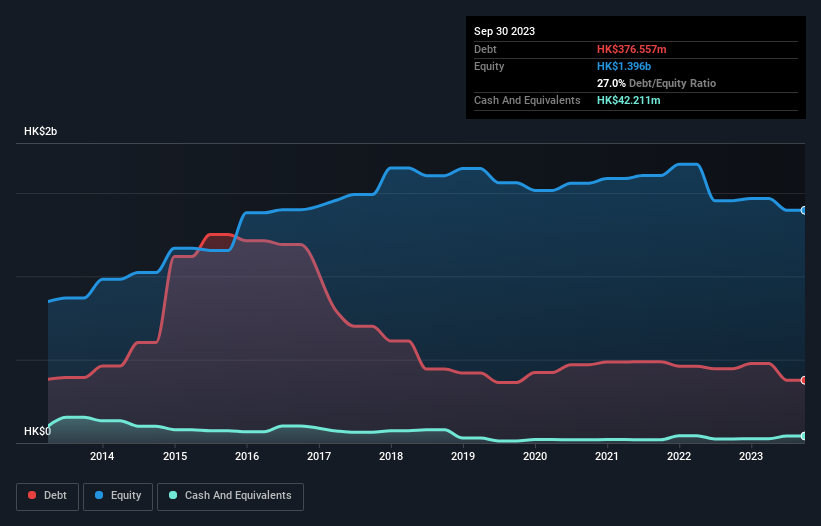- Hong Kong
- /
- Real Estate
- /
- SEHK:262
Is Deson Development International Holdings (HKG:262) Weighed On By Its Debt Load?
Howard Marks put it nicely when he said that, rather than worrying about share price volatility, 'The possibility of permanent loss is the risk I worry about... and every practical investor I know worries about.' So it seems the smart money knows that debt - which is usually involved in bankruptcies - is a very important factor, when you assess how risky a company is. As with many other companies Deson Development International Holdings Limited (HKG:262) makes use of debt. But the real question is whether this debt is making the company risky.
What Risk Does Debt Bring?
Debt assists a business until the business has trouble paying it off, either with new capital or with free cash flow. Ultimately, if the company can't fulfill its legal obligations to repay debt, shareholders could walk away with nothing. However, a more usual (but still expensive) situation is where a company must dilute shareholders at a cheap share price simply to get debt under control. Having said that, the most common situation is where a company manages its debt reasonably well - and to its own advantage. The first step when considering a company's debt levels is to consider its cash and debt together.
Check out our latest analysis for Deson Development International Holdings
What Is Deson Development International Holdings's Debt?
You can click the graphic below for the historical numbers, but it shows that Deson Development International Holdings had HK$376.6m of debt in September 2023, down from HK$445.8m, one year before. On the flip side, it has HK$42.2m in cash leading to net debt of about HK$334.3m.

A Look At Deson Development International Holdings' Liabilities
We can see from the most recent balance sheet that Deson Development International Holdings had liabilities of HK$422.9m falling due within a year, and liabilities of HK$223.9m due beyond that. Offsetting these obligations, it had cash of HK$42.2m as well as receivables valued at HK$35.6m due within 12 months. So its liabilities outweigh the sum of its cash and (near-term) receivables by HK$569.0m.
The deficiency here weighs heavily on the HK$101.2m company itself, as if a child were struggling under the weight of an enormous back-pack full of books, his sports gear, and a trumpet. So we definitely think shareholders need to watch this one closely. After all, Deson Development International Holdings would likely require a major re-capitalisation if it had to pay its creditors today. There's no doubt that we learn most about debt from the balance sheet. But you can't view debt in total isolation; since Deson Development International Holdings will need earnings to service that debt. So when considering debt, it's definitely worth looking at the earnings trend. Click here for an interactive snapshot.
Over 12 months, Deson Development International Holdings made a loss at the EBIT level, and saw its revenue drop to HK$71m, which is a fall of 39%. To be frank that doesn't bode well.
Caveat Emptor
While Deson Development International Holdings's falling revenue is about as heartwarming as a wet blanket, arguably its earnings before interest and tax (EBIT) loss is even less appealing. Its EBIT loss was a whopping HK$44m. If you consider the significant liabilities mentioned above, we are extremely wary of this investment. That said, it is possible that the company will turn its fortunes around. But we think that is unlikely, given it is low on liquid assets, and burned through HK$33m in the last year. So we consider this a high risk stock and we wouldn't be at all surprised if the company asks shareholders for money before long. The balance sheet is clearly the area to focus on when you are analysing debt. But ultimately, every company can contain risks that exist outside of the balance sheet. For instance, we've identified 3 warning signs for Deson Development International Holdings (1 can't be ignored) you should be aware of.
At the end of the day, it's often better to focus on companies that are free from net debt. You can access our special list of such companies (all with a track record of profit growth). It's free.
New: Manage All Your Stock Portfolios in One Place
We've created the ultimate portfolio companion for stock investors, and it's free.
• Connect an unlimited number of Portfolios and see your total in one currency
• Be alerted to new Warning Signs or Risks via email or mobile
• Track the Fair Value of your stocks
Have feedback on this article? Concerned about the content? Get in touch with us directly. Alternatively, email editorial-team (at) simplywallst.com.
This article by Simply Wall St is general in nature. We provide commentary based on historical data and analyst forecasts only using an unbiased methodology and our articles are not intended to be financial advice. It does not constitute a recommendation to buy or sell any stock, and does not take account of your objectives, or your financial situation. We aim to bring you long-term focused analysis driven by fundamental data. Note that our analysis may not factor in the latest price-sensitive company announcements or qualitative material. Simply Wall St has no position in any stocks mentioned.
About SEHK:262
Deson Development International Holdings
An investment holding company, primarily engages in the property investment and development businesses in Hong Kong and Mainland China.
Flawless balance sheet and slightly overvalued.
Market Insights
Community Narratives




